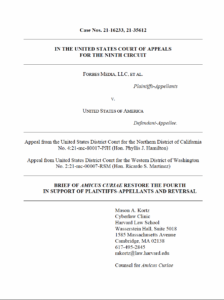Clinic Supports Restore the Fourth, Files Brief re: All Writs Act Requests
Blog – Cyberlaw Clinic 2022-02-07
 On Monday, January 10, 2022, the Cyberlaw Clinic filed an amicus brief (.pdf) in the United States Court of Appeals for the Ninth Circuit in support of Forbes Media, LLC (“Forbes Media”). The Clinic filed this brief on behalf of Restore the Fourth, Inc., a non-partisan non-profit focused on issues of privacy, surveillance, and the Fourth Amendment. The brief supports Forbes Media in seeking a reversal of a Northern District of California opinion that denied the disclosure of non-identifying portions of law enforcement All Writs Act (“AWA”) requests.
On Monday, January 10, 2022, the Cyberlaw Clinic filed an amicus brief (.pdf) in the United States Court of Appeals for the Ninth Circuit in support of Forbes Media, LLC (“Forbes Media”). The Clinic filed this brief on behalf of Restore the Fourth, Inc., a non-partisan non-profit focused on issues of privacy, surveillance, and the Fourth Amendment. The brief supports Forbes Media in seeking a reversal of a Northern District of California opinion that denied the disclosure of non-identifying portions of law enforcement All Writs Act (“AWA”) requests.
This case originates from the work of Thomas Brewster, an associate editor for Forbes, who discovered an All Writs Act application compelling Sabre, a travel technology firm, to provide the FBI with real-time location information of an individual with an outstanding warrant. In January 2021, Forbes Media filed a petition in the California Northern District Court asking the court to unseal a number of other All Writs Act applications for surveillance filed by law enforcement. In July 2021, this petition was denied.
In support of Forbes Media’s position, the Clinic’s brief notes that the All Writs Act, enacted in 1789, was only meant for use in extraordinary and limited circumstances. As law enforcement AWA petitions for surveillance are sealed, meaning they are not accessible to the public, the use of this Act for surveillance is particularly troublesome. Law enforcement agencies use AWA petitions to compel private actors to conduct surveillance that these agencies could not conduct without adhering to the requirements of more modern surveillance acts.
For example, the 1968 Wiretap Act, the 1986 Stored Communications Act, and the 1986 Pen Register Act all have procedural steps that must be met for law enforcement agencies to request the use of surveilling technology and reporting requirements for these agencies as well as the courts that grant these requests. In contrast, the All Writs Act is extremely open-ended and allows courts to issue “all writs necessary or appropriate in aid of their respective jurisdictions and agreeable to the usages and principles of law” and does not have similar procedural and reporting requirements. Thus, AWA petitions for surveillance allow law enforcement agencies to avoid some of the safeguards and oversight built into modern surveillance acts.
The lack of reporting requirements for AWA surveillance petitions is particularly concerning as transparency in the actions of law enforcement allows for public accountability and plays a critical role in Congress passing acts like the modern surveillance acts. As the brief notes, the public cannot provide commentary on the actions of law enforcement if those actions are sealed beyond the public’s view.
The brief was authored by Fall 2021 Cyberlaw Clinic students Adira Levine, Caleb O’Quinn, and Breanne Parker, collaborating closely with HLS Clinical Instructor Mason Kortz. The clinic looks forward to the Ninth Circuit’s decision in this case.